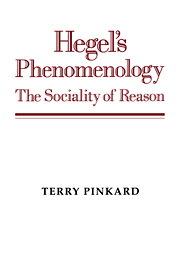Book contents
- Frontmatter
- Contents
- Acknowledgments
- Hegel's Phenomenology
- 1 Why the Phenomenology of Spirit?
- 2 The claims to self-sufficient knowledge: sense-certainty, perception, understanding
- 3 The claims of self-sufficient agency: freedom and self-consciousness
- 4 Modern life's project of self-justification
- 5 Modern life's alternatives and modern life's possibilities
- 6 The self-reflection of the human community
- 7 The essential structure of modern life
- Notes
- Works cited
- Index
4 - Modern life's project of self-justification
Published online by Cambridge University Press: 05 September 2014
- Frontmatter
- Contents
- Acknowledgments
- Hegel's Phenomenology
- 1 Why the Phenomenology of Spirit?
- 2 The claims to self-sufficient knowledge: sense-certainty, perception, understanding
- 3 The claims of self-sufficient agency: freedom and self-consciousness
- 4 Modern life's project of self-justification
- 5 Modern life's alternatives and modern life's possibilities
- 6 The self-reflection of the human community
- 7 The essential structure of modern life
- Notes
- Works cited
- Index
Summary
Reason, science, and modern affirmations
The transition to “Reason”
After concluding the section on the “unhappy consciousness,” Hegel begins an entirely new section titled “Reason.” Hegel's reasons for this transition have proved puzzling to some commentators, leading some to hypothesize that the book indeed has no coherent structure and that the section on “Reason” in particular shows that Hegel changed his mind about the composition of the book while he was writing it and did not have the time to revise the whole manuscript in light of this change of plan. Other commentators, noting the differences between the transition in the 1807 Phenomenology and in the later works, particularly the Encyclopedia, have concluded that Hegel in his later Heidelberg and Berlin years simply abandoned the Phenomenology's approach to things.
However, Hegel's reasons for making this transition can be elicited both from the structure of the Phenomenology and by attention to his later writings. There are good, systemic reasons within the structure of the text of the Phenomenology itself for the move. In the section on “Consciousness,” the issue of what counts as knowledge is treated as having to do with a kind of unreflective fusion of both the subjective and the objective points of view and a failure to distinguish them.
- Type
- Chapter
- Information
- Hegel's PhenomenologyThe Sociality of Reason, pp. 79 - 134Publisher: Cambridge University PressPrint publication year: 1994



